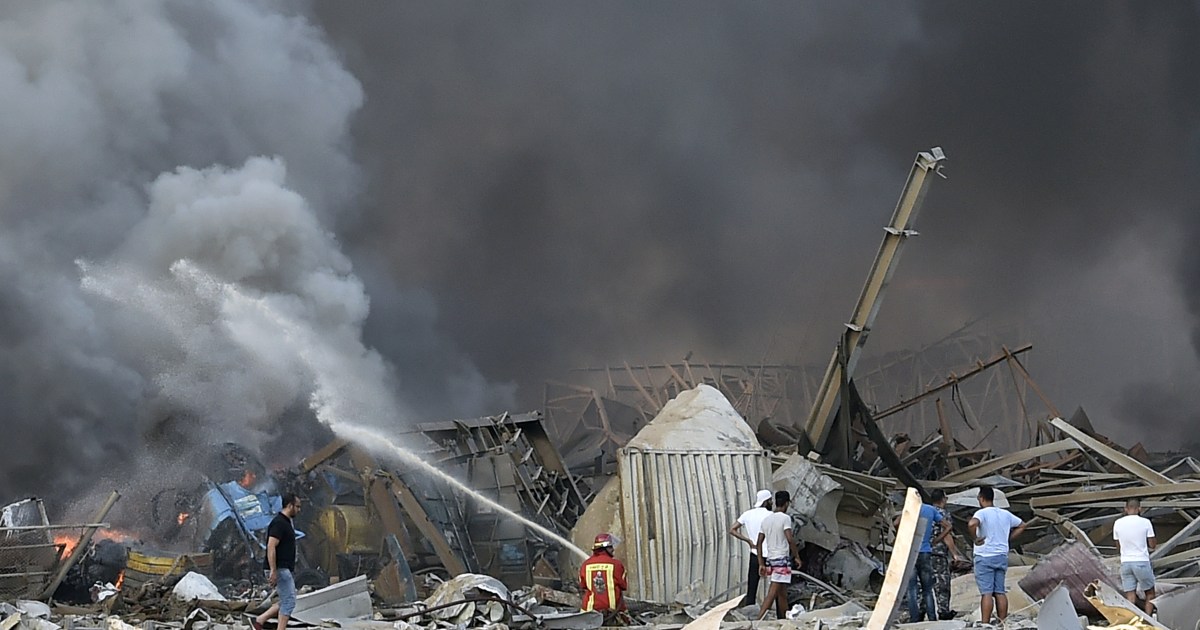Two sources said that Germany will present to the Lebanese authorities next week a plan costing billions of dollars to rebuild the port of Beirut as part of efforts to urge the country's politicians to form a government capable of avoiding an economic collapse.
The explosion of chemicals in the Beirut port last August killed two hundred people and injured thousands, destroyed entire neighborhoods in the Lebanese capital, and plunged the country into its worst political and economic crises since the 1975-1990 civil war.
According to two diplomatic sources familiar with the plan, Germany and France are seeking to lead the reconstruction efforts.
And they said that on April 7, Berlin will put forward a proposal that the European Investment Bank agreed to help finance, according to which the area would be evacuated and facilities rebuilt.
One of the sources estimated that the EIB financing would be between 2 billion and 3 billion euros.
A senior Lebanese official confirmed that Germany would present a comprehensive proposal for rebuilding the port.
Neither the German foreign ministry nor consulting firm Roland Berger, which the two diplomatic sources said had put together the plan, responded to requests for comment.
No comment was available from the European Investment Bank.
The two sources said that the political elite in Lebanon first needs to agree to form a new government to reform the budget and eradicate corruption, a condition that donors, including the International Monetary Fund, insist on implementing before releasing billions of dollars in aid.
"Committed" government
One of the sources said, "This plan will not come without conditions. Germany and France first want to see a government in place committed to implementing reforms. There is no other way than that, and this is good for Lebanon."
Eight months after the port disaster, many Lebanese who lost their families, homes and businesses are still awaiting the results of the investigation into the causes of the explosion.
Lebanon is on the verge of collapse as shoppers quarrel over goods, protesters block roads and businesses close their doors.
Foreign donors said the new government should have a strict mandate to implement economic reforms, including scrutiny of the central bank and electricity sector reform.
However, Prime Minister-designate Saad Hariri and President Michel Aoun were unable to agree on a cabinet lineup.
The caretaker government, which resigned after the explosion, is still carrying out its duties.
The International Monetary Fund said there had been no discussions about the programs with Lebanese officials, and that it had only provided technical assistance to the Finance Ministry and some state-owned companies.
Development
In addition to the port itself, the German proposal will address the idea of redeveloping an area surrounding it with an area of about one million square meters, in a project that the two diplomatic sources said would be similar to the reconstruction of downtown Beirut after the war.
Like the post-war plan, the proposal includes establishing a listed company similar to the Lebanese Company for the Development and Reconstruction of Downtown Beirut, Solidere, which was founded by the late Prime Minister Rafik Hariri in the 1990s and is still listed on the Lebanese Stock Exchange.
The two sources estimated the cost of the project at between 5 and 15 billion dollars, and said that it would create 50,000 jobs.
The Lebanese official said that France and CMACGM Group for Ports and Container Shipping are also interested in the reconstruction project.
One of the diplomatic sources indicated that France sent several missions, including one last March, which included the "CMACGM" group, during which it showed its interest in playing a role in the reconstruction operations.
But he added that the mission focused more on specific clearance operations than on broader redevelopments.
The French Foreign Ministry declined to comment immediately.
CMACGM also declined to comment.
The Lebanese official indicated that the decision to start implementing the project will depend on the Europeans' agreement on who will lead the matter.
"This is a European decision at the end of the day, because they have to decide that among themselves. And when that is done, the Lebanese government can move forward," he said.
The two diplomatic sources said that Germany wants to work closely with France in this regard, but Paris is continuing its own initiatives for the time being.
One said, "What is ironic in all of this is that on the one hand the Europeans are talking about exerting pressure on the political class (in Lebanon), and on the other hand they are bickering with each other over potential contracts when it comes to getting a share of the pie."

